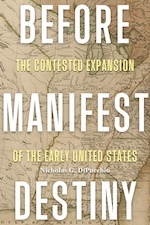Today, we are happy to bring you our conversation with Nicholas G. DiPucchio, author of Before Manifest Destiny: The Contested Expansion of the Early United States
What inspired you to write this book?
During my first year of graduate school, I learned that the Bermudians sent a delegation to the Continental Congress in 1775. Thereafter, I encountered letters, pamphlets, and proposed treaties written by revolutionary policymakers advocating the annexation or independence of the archipelago. That research turned into a research seminar paper, and later the first chapter of Before Manifest Destiny. US interest in Bermuda during the War for Independence inspired me to search for contested episodes of US expansion within and beyond the United States’ modern boundaries. From there, I became fascinated by the many unrealized territorial plans of early US policymakers that challenged the static narrative of inevitable, manifest destiny. I had no idea that an expansionist vision of manifest destiny would become relevant again!
What did you learn and what are you hoping readers will learn from your book?
I hope readers will learn about the contested nature of US expansion. What struck me was the dynamic nature of US expansion. Rather than reading manifest destiny back into the earlier decades, my book showcases how US policymakers repeatedly revised their plans for territorial expansion. For example, consider Michigan, where I currently live. During the War of 1812, US General William Hull launched an invasion of Upper Canada, hoping to deter the powerful Anishinaabe peoples from allying with the British and Shawnee chief Tecumseh. Instead, Hull surrendered Detroit, and US policymakers contemplated a future without Canada and Michigan. US policymakers’ plans for expansion proved far more dynamic than we give credit, and were often formulated out of fear.
What surprised you the most in the process of writing your book?
What surprised me the most was how much we assume in hindsight. It is easy to dismiss audacious plans for Bermuda, Canada, and Cuba as ridiculous in 2025. However, these unrealized plans seemed like real possibilities for early US leaders from Benjamin Franklin to George Washington. When we recover their viewpoints, we uncover countless thwarted expansionist imaginings, which included boundaries far more and far less extensive than the modern United States. Even optimistic expansionists such as Thomas Jefferson contemplated a future West full of breakaway republics and pan-Indigenous confederacies. Nothing was preordained or destined. The story of US expansion is one of choices and contingency.
What’s your favorite anecdote from your book?
One of my favorite anecdotes from the book is found in the conclusion. When reading the Detroit Gazette, I encountered a soothsayer’s prediction in the 1810s for the year 2000. This soothsayer anticipated a future in which the United States would annex Canada, eastern Russia, and Jamaica. While ridiculous in hindsight, this soothsayer’s predictions proved not far off from the many audacious proposals raised by policymakers and expansionists in the early nineteenth century. Some Americans could not imagine extending the republic to the Pacific coast. Others felt that Cuba belonged to the national union more than what would become the present-day US Southwest. So, while wrong about the future, this soothsayer’s predictions proved not far off from their contemporaries.
What’s next?
My wife and I are expecting a baby in late July, so that is next! As for research, I am interested in early US diplomacy, particularly the life of Silas Deane. A lawyer, merchant, and diplomatic agent, Deane became entangled in the American revolutionaries’ efforts to secure aid and military support from France. Deane was accused of embezzlement, became an advocate for reconciliation with the British, and died under mysterious circumstances. I am curious about what his life says about early US diplomacy and loyalties amid the American Revolution. He appears in the first chapter of Before Manifest Destiny, and was one of the first to advocate the conquest of Bermuda!





